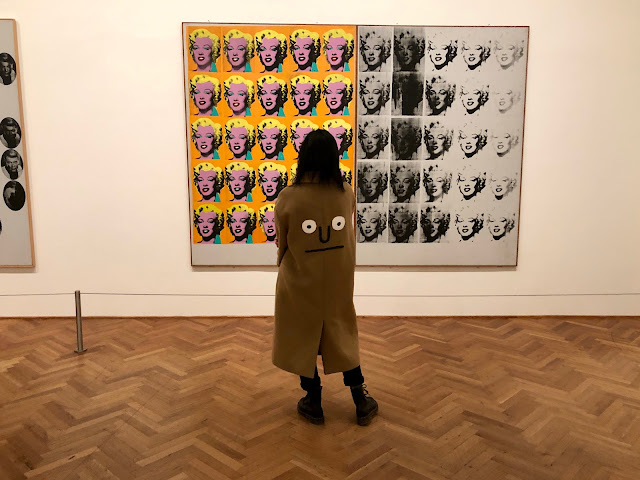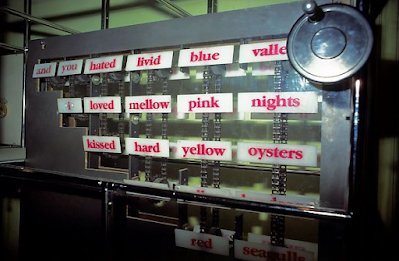
When I think of my wife's amazing ability to prepare for complicated situations, I remember her getting our apartment ready for children more than a quarter of a century ago. Not just gathering baby furniture and hiring a consultant to go through the place and point out unprotected electrical outlets, but laying in all manner of necessary supplies.
In one flash of recollection, I idly reach over to a table and pick up a large bag of cotton balls.
"Cotton balls?" I inquire idly of my very pregnant wife, holding up the white puffy bag. "What do we need cotton balls for?"
The next moment it's 3 a.m. and I'm pressing the baby, squirming and howling, gainst my shoulder with one hand while the other reaches out in her direction, fingers waggling frantically. "Quick!" I cry. "Give me a cotton ball!"
Although I still don't know what the cotton balls were for. To dab something, no doubt. Or administer some kind of ointment. Forgetting the specifics being part of the amnesia process that allows second children to come into the world.
Anyway, last Thursday we arrived in Colorado to shut down and pack up my parents' home after 35 years and my wife shocked me, and I imagine my parents, by striding in, saying hello and not ... as I would have done, left to my own devices ... making tea and small talk and playing Scrabble, or going to the Pearl Street Mall to browse the hip boutiques, or wandering down the trails that begin practically in their back yard. Instead she promptly mobilized everybody, hands flying while issuing instructions that somehow never came across as orders, while we all busied to the task at hand, into getting the million things done that needed to get done before before the movers showed up Monday morning.
Groping for a way to convey what she had done, I came up with General Eisenhower planning Operation Overlord.
"Operation Overlord?" she asked.
"D-Day," I explained.
So passed Thursday and Friday, Saturday and Sunday, a blur of busyness, building boxes, wadding up newspapers, filling bags of garbage, hauling them out to the dumpster. My little brother was a superstar, in business meetings much of the day but still shouldering the burden in a way that amazed me. He also popped for a lux lunch at Japango at a key moment, keeping us all from going insane. My mother was coaxed into making decisions: keep this, get rid of that, and did so with a minimum of sentiment and a maximum of what can only be described as courage. My father gradually perceived that a change was in the works.
"I'm going to miss this house," he announced one morning, surprising us all. "It's been a good house." So he was on board with the move, at least for the moment.
Now it was Monday morning, and my task was a simple one: get my parents out of the way for a few hours. Otherwise my mother would captivate and charm the moving crew, and the hours that were supposed to be dedicated to loading the truck would instead be spent sitting at her feet, fingers laced around their knees, raptly listening to her sing, "Embraceable You."
First breakfast at Tangerine, complete with a pair of mimosas for them to celebrate their new life in Chicago. I surprised myself by ordering the vegetarian hash (when in Rome) served on a bed of pumpkin puree. My mother, true to form, chatted with a young lady at the next table about the tattoos on her upper leg. Penguins? No, the ghosts from "Beetlejuice."
But even lingering, breakfast took less than an hour. So Plan B was in order.
"I wouldn't mind a good picture of the Flatirons," I told my mother as we got in the car afterward. She directed me this way and that, driving past gorgeous Victorian houses and construction sites, always too close, or the view blocked, I gamely took a few shots of the distinctive formations, which hove into their current position about 50 million years ago and symbolize the city of Boulder.
Now what? Luckily she thought of friends who live a few miles out-of-town.
"Let's go say goodbye!" I suggested, and we headed there. That was very nice, sitting in their lovely, enormous living room—her husband owns a big roofing company. I killed time telling stories until my mother cut my performance short ("You're giving a monologue," she said, curtly) and we returned to their home—for the past 34 years and the next five days—a few minutes after the movers left. (United Van Lines, by the way. Not just professional, but kind. Communicated thoroughly beforehand, always available, the process orderly and transparent. I felt I got to know Barbara and Bill. The crew arrived when they said they would. Pay the extra money. It's worth it)
Tuesday, I had to run to Home Depot for more boxes—for stuff that wasn't being moved, but shipped to my sister in Dallas. At at a red light a block from their house, at the intersection of Valmont and Foothills Parkway, I looked over and realized the mountains were at the angle and lighting that struck me as characteristic of what I've been gazing at for the past 49 years, since I first came blinking in wonder to Colorado so my father could spend the summer working at the National Center for Atmospheric Research. After all that chasing around, all I had to do was roll down the window and snap a picture. Though of course the Flatirons are too huge and impressive to be captured by anything as paltry as a photograph. A single shot and then the light turned green and I hurried on my way.





 ."
." 
